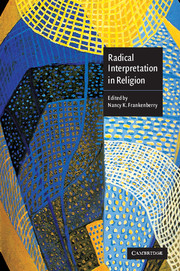Book contents
- Frontmatter
- Contents
- Notes on the contributors
- Preface
- Acknowledgments
- PART I PRAGMATICS
- PART II CULTURE AND COGNITION
- Introduction
- 5 “The Chinese believe in spirits”: belief and believing in the study of religion
- 6 On interpreting the world religiously
- 7 Are religious beliefs counter-intuitive?
- PART III SEMANTICS
- Select bibliography
- Index
7 - Are religious beliefs counter-intuitive?
Published online by Cambridge University Press: 13 November 2009
- Frontmatter
- Contents
- Notes on the contributors
- Preface
- Acknowledgments
- PART I PRAGMATICS
- PART II CULTURE AND COGNITION
- Introduction
- 5 “The Chinese believe in spirits”: belief and believing in the study of religion
- 6 On interpreting the world religiously
- 7 Are religious beliefs counter-intuitive?
- PART III SEMANTICS
- Select bibliography
- Index
Summary
Anthropologists are great suppliers to the general public, and to certain philosopher clients, of strange beliefs said to be held by remote people. These seem to furnish raw material for thought experiments concerned with the question: how is it possible to hold such beliefs? Or, in the fashion of Davidson: how can one interpret statements by people who apparently believe such bizarre things about the world? On the other hand, most anthropologists, who have studied remote people and who have been engaged in the practice of understanding those foreign others who say this type of thing in real situations, are keen to stress, often to the very same philosophers, that the strangest thing about strange people is how easy interpretation turns out to be.
One way of dealing with this anomaly, one to which I partly subscribe, has been developed by Sperber and then greatly elaborated and somewhat modified by Boyer. It consists in questioning the apparent strangeness of these beliefs. This position involves stressing that, before one considers the content of bizarre belief statements, one should consider the pragmatic cues which mark how they are intended to be understood in the real world. More particularly, both writers stress that the many strange belief statements reported by anthropologists, which have employed the time of a number of philosophers, are merely intended as tentative propositions about the world and that some intention of the sort is always pragmatically indicated, if only by the obvious counter-intuitive aspect of the assertions of belief.
- Type
- Chapter
- Information
- Radical Interpretation in Religion , pp. 129 - 146Publisher: Cambridge University PressPrint publication year: 2002
- 23
- Cited by



